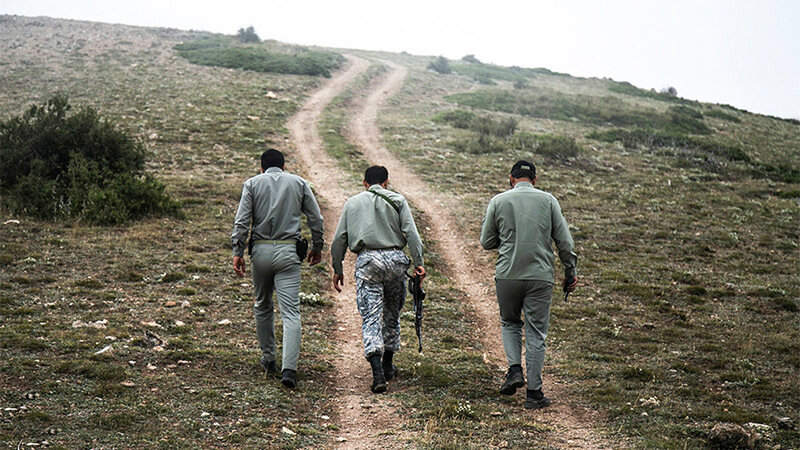Rangers at forefront of nature conservation

TEHRAN – Environmental defenders and rangers are at the forefront of protecting wildlife, natural resources, and ecosystems, while sometimes sacrificing their lives to protect nature.
July 31 is designated as World Ranger Day, which celebrates the work rangers do to protect the planet's natural treasures and cultural heritage and commemorates the guardians of nature killed or injured in the line of duty.
In Iran, some rangers have lost their lives to protect the environment and natural resources, although laws have been passed to protect them. Nevertheless, we are still witnessing the martyrdom of the guardians of nature.
The bill for the protection of rangers’ rights was approved by the parliament in July 2019. Also, the law for the protection of rangers was approved in June 2020, however, a number of unfortunate incidents, from mutilation and martyrdom to armed attacks had happened to these devoted defenders.
According to the international standard, there should be one ranger per thousand hectares, but in Iran, there is one ranger per 12,000 hectares, which means that the number of rangers in Iran is one-twelfth of the world standard, while the rangers protect 11 percent of the country's natural areas.In September 2019, a ranger, Mohammad Hassannejad, was shot dead by poachers in the Armak area of Hormozgan province, ISNA reported.
Ebrahim Ghotb, a ranger in Bamoo National Park, was shot in the chin by his own weapon and lost his life.
Other unfortunate incidents in the field of environmental protection in the country over the last year (March 2020-March 2021) include the attack of illegal haunters on the Gatvand environmental checkpoint when Amin Hadipour was shot and lost a leg.
In April, two rangers from Zanjan province, Mehdi Mojallal, and Mikael Hashemi, were shot dead in a clash with poachers in the Fileh Khaseh protected area.
Many experts believe that contradictory hunting laws in the field of protection and illegal distribution of hunting weapons are the cause of such incidents. Clashes between rangers and poachers have been frequent in recent years, and some have even threatened to kill the rangers.
In recent years, more than 15 members of the country's forestry forces have lost their lives and a number of others have been injured in clashes with wood smugglers or while extinguishing fires in forests and pastures.
Saeed Mahmoudi, head of the Tehran department of environment (DOE), criticized the limited facilities of environmental protection and said that unfortunately, we do not have access to the latest equipment to protect nature, so more efforts should be made to improve the rangers’ condition.
However, Jamshid Mohabbat-Khani, commander of the protection unit of the DOE, announced on June 22 that 72 billion pieces of equipment had been provided to the rangers. On July 26, some 1,200 motorcycles were handed over to the environmental defenders.
The other challenges the rangers are dealing with are the low wages.
Currently, 3,600 rangers are in charge of defending the protected areas, which should reach at least up to 8,000, he said, adding, there are over 600 stations in the country, 100 of which are inactive due to lack of manpower.
According to the international standard, there should be one ranger per thousand hectares, but in Iran, there is one ranger per 12,000 hectares, which means that the number of rangers in Iran is one-twelfth of the world standard, while the rangers protect 11 percent of the country's natural areas, Mohabbat-Khani stated.
To compensate for part of this shortage, we obtained a license to hire rangers for 10 consecutive years, through which 250 ranchers were employed each year, he said, adding, this year, 300 rangers are to be recruited, 50 of whom are sea rangers.
Challenges facing rangers
A long-awaited bill to protect the rights of rangers including rules on carrying and use of firearms was approved by Majlis [Iranian parliament] in June 2020.
The bill was drafted in July 2016 by the Department of Environment following the death of two rangers, Mohammad Dehqani and Parviz Hormozi who were killed in June 2016 during an armed conflict with poachers in Hormozgan province. It has been approved by the judiciary committee of Majlis in September 2019.
As per the proposed bill the rangers would not face charges in case of involuntary manslaughter while on duty and would be compensated for the losses they suffer while trying to protect the environment and biodiversity, the government is required to allocate budget to help those rangers who might be obliged to pay out blood money or other sorts of money-penalty compensation for murder or any injuries trespassers may suffer in armed conflicts with them, and the rangers will be provided with regular insurance coverage and are entitled to compensation for the losses they suffer while doing their job.
Before, the rangers hold weapons only to survive, but now the environmental defenders are allowed to use weapons. However, the use of weapons is the last resort, and only when the lives of defenders are in danger and it must be proven that there has been no other way to save the life of the ranger.
If two rangers encounter offenders and one does not have a weapon and his life is in danger, the other ranger who has a weapon can defend his colleague.
Some 123 rangers have been killed while protecting the environment since 1979 in Iran.
FB/MG

Leave a Comment